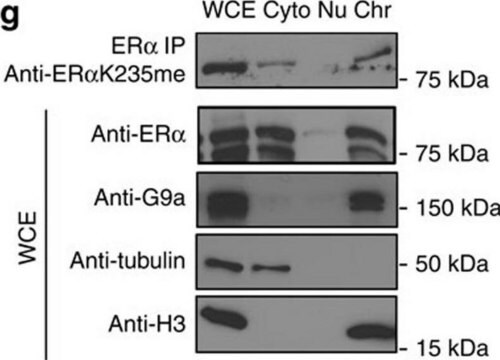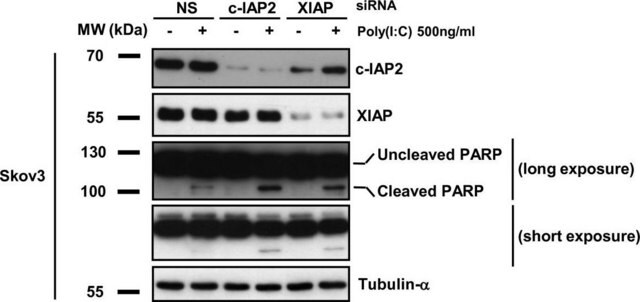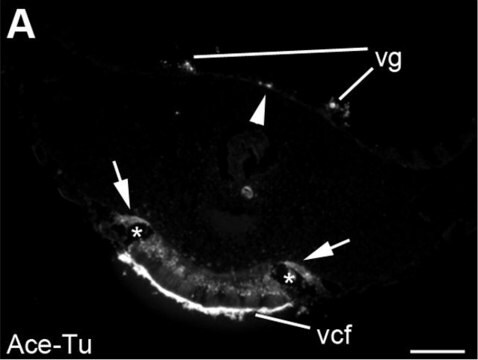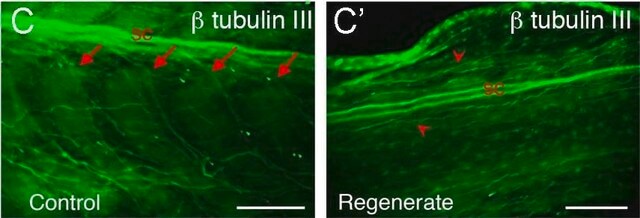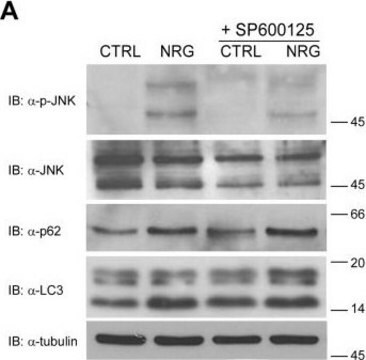推荐产品
生物源
mouse
抗體表格
purified from hybridoma cell culture
抗體產品種類
primary antibodies
無性繁殖
SAP.4G5, monoclonal
形狀
buffered aqueous solution
分子量
~55 kDa
物種活性
bovine, gerbil, Xenopus, human, canine, mouse, hamster, chicken, rat, monkey
濃度
~1.0 mg/mL
技術
immunoblotting: 0.06-0.12 μg/mL using HeLa cell extract
immunofluorescence: 1-2.5 μg/mL using HeLa cells
immunohistochemistry: 1-2 μg/mL using heat-retrieved formalin-fixed, paraffin-embedded human fallopian tube or testis sections.
同型
IgG1
UniProt登錄號
運輸包裝
dry ice
儲存溫度
−20°C
目標翻譯後修改
unmodified
基因資訊
human ... TUBB(203068)
一般說明
Monoclonal Anti-β-Tubulin I (mouse IgG1 isotype) is derived from the SAP.4G5 hybridoma produced by the fusion of mouse myeloma cells and splenocytes from a BALB/c mouse. Tubulin is the major building block of microtubules, an intracellular cylindrical filamentous structure, that is present in almost all eukaryotic cells. Tubulin exists in all cells as a 100 kDa protein, which assembles from heterodimers of α-tubulin and β-tubulin; both have a molecular weight of 55 kDa and share considerable homology.
免疫原
synthetic peptide corresponding to the C-terminal sequence of ß-tubulin isotype I, conjugated to BSA
應用
Anti-β-Tubulin I antibody, Mouse monoclonal has been used in:
- immunoblotting
- immunofluorescence
- immunohistochemistry
生化/生理作用
β-Tubulin I is also useful in deducing the role that different tubulin isotypes play in nerve development, function or maintenance.
外觀
Solution in 0.01 M phosphate buffered saline, pH 7.4, containing 15 mM sodium azide.
免責聲明
Unless otherwise stated in our catalog or other company documentation accompanying the product(s), our products are intended for research use only and are not to be used for any other purpose, which includes but is not limited to, unauthorized commercial uses, in vitro diagnostic uses, ex vivo or in vivo therapeutic uses or any type of consumption or application to humans or animals.
未找到合适的产品?
试试我们的产品选型工具.
儲存類別代碼
10 - Combustible liquids
水污染物質分類(WGK)
WGK 1
閃點(°F)
Not applicable
閃點(°C)
Not applicable
Brian Perry et al.
Journal of the Association for Research in Otolaryngology : JARO, 4(3), 329-338 (2003-12-24)
The seven mammalian isotypes of beta tubulin are strikingly similar in amino acid sequence. The differences in isotypic sequence, although small, are nonetheless conserved in evolution, which suggests that they may confer distinct functional roles. If so, such roles should
Tubulin modifications and their cellular functions
Hammond JW, et al.
Current Opinion in Cell Biology, 20(1), 71-76 (2008)
S S Siddiqui et al.
The Journal of neuroscience : the official journal of the Society for Neuroscience, 9(8), 2963-2972 (1989-08-01)
We have identified 2 anti-tubulin monoclonal antibodies that bind to 2 different subpopulations of identified neurons in the simple nervous system of the nematode Caenorhabditis elegans. The antibodies also recognize specific tubulin isotypes from C. elegans that were separated by
M C Roach et al.
Cell motility and the cytoskeleton, 39(4), 273-285 (1998-05-15)
Tubulin, the subunit protein of microtubules, is an alpha/beta heterodimer. In many organisms, both alpha and beta consist of various isotypes. Although the isotypes differ in their tissue distributions, the question of whether the isotypes perform different functions in vivo
我们的科学家团队拥有各种研究领域经验,包括生命科学、材料科学、化学合成、色谱、分析及许多其他领域.
联系技术服务部门